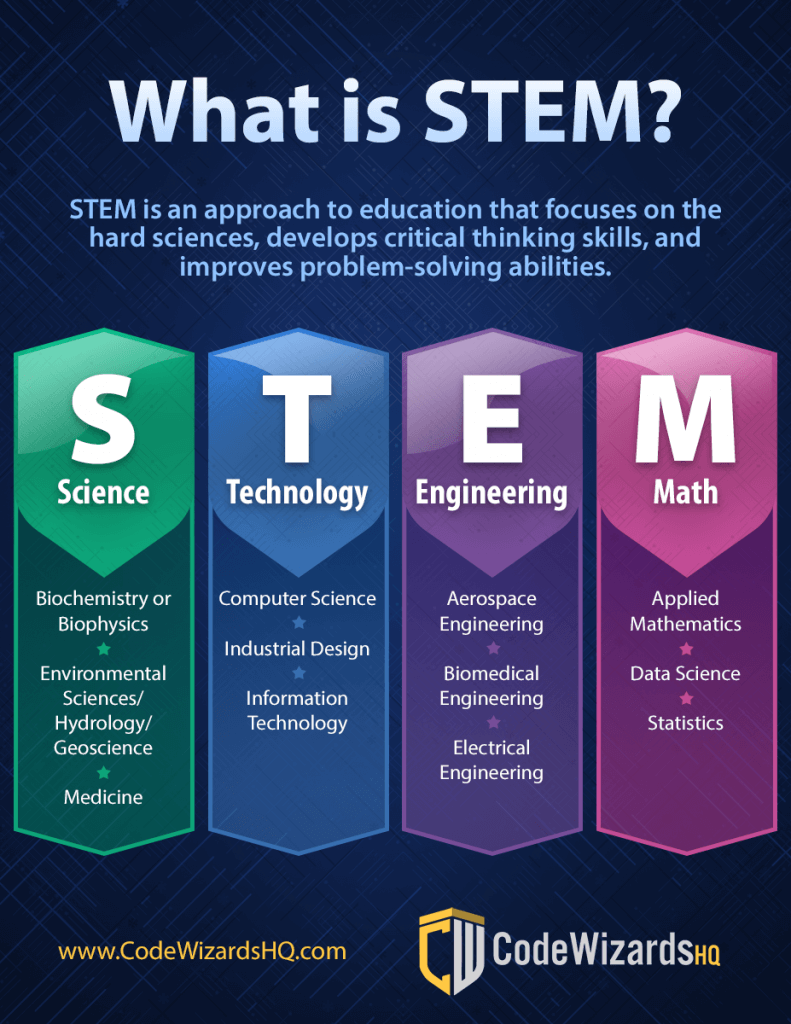Introduction
In an era defined by technological advancements and scientific breakthroughs, STEM fields have emerged as the backbone of innovation and progress. From developing cutting-edge technology to understanding the mysteries of the universe, STEM disciplines play a pivotal role in shaping our world. This blog post delves into the exciting world of STEM, highlighting the significance of science, technology, engineering, and mathematics, and the vast array of career opportunities they offer.
Science
Science is the systematic pursuit of knowledge through observation and experimentation. It encompasses a wide range of disciplines, including biology, chemistry, physics, environmental science, and astronomy. Scientists in these fields explore the natural world, seeking answers to fundamental questions and addressing pressing global challenges.
Biology, for example, is the study of life in all its forms. Biologists work to unravel the complexities of genetics, ecosystems, and the human body, contributing to advancements in medicine and conservation. Meanwhile, astronomers peer into the cosmos, investigating the origins of the universe and searching for extraterrestrial life.
Technology
Technology, often synonymous with innovation, is the application of scientific knowledge for practical purposes. It includes fields like computer science, information technology, and electronics. In today’s digital age, technology drives almost every aspect of our lives, from smartphones to autonomous vehicles.
Computer science, a prominent STEM discipline, underpins the digital world. Computer scientists develop software, design algorithms, and build systems that power our modern society. The constant evolution of technology ensures a dynamic and in-demand career path for those with the skills and knowledge to harness its potential.
Engineering
Engineering is all about designing and building solutions to real-world problems. Engineers use scientific principles to create structures, machines, systems, and processes that improve our lives. From civil engineering to aerospace engineering, this field offers diverse opportunities for creativity and innovation.
Civil engineers, for instance, design and construct infrastructure, from bridges to skyscrapers, ensuring the safety and functionality of the built environment. Aerospace engineers work on the cutting edge of technology, developing spacecraft and aircraft that push the boundaries of human exploration.
Mathematics
Mathematics, often referred to as the language of science, provides the theoretical foundation for STEM fields. It is essential for modeling complex phenomena, solving problems, and making informed decisions. Mathematics includes fields such as algebra, calculus, statistics, and geometry.
Statisticians, for example, play a crucial role in analyzing data to make informed decisions in various industries, from healthcare to finance. Mathematicians also contribute to cryptography, ensuring the security of digital communication and transactions.
Significance of STEM Fields
STEM fields are not only academically challenging but also have a profound impact on our daily lives and the world at large. Here are some reasons why STEM is of great significance:
- Advancing Technology
The rapid pace of technological innovation is driven by experts in STEM fields. Without their expertise, we wouldn’t have smartphones, the internet, or self-driving cars. Every breakthrough in technology, from the invention of the transistor to the development of artificial intelligence, owes its existence to STEM professionals. - Solving Global Challenges
The world faces complex challenges such as climate change, disease outbreaks, and resource depletion. STEM disciplines are at the forefront of addressing these issues. Environmental scientists work to understand climate change and develop sustainable solutions. Medical researchers strive to find cures for diseases that plague humanity. STEM professionals are essential for finding solutions to these critical problems. - Economic Growth
STEM fields are crucial for economic growth and job creation. The skills and knowledge acquired in STEM disciplines are in high demand, and they often lead to well-compensated careers. Additionally, STEM-driven innovation can create new industries and stimulate economic development. - Exploration and Discovery
From probing the depths of the ocean to venturing into space, STEM fields enable us to explore the unknown. Space agencies like NASA and private companies like SpaceX rely on scientists, engineers, and mathematicians to make space exploration a reality. Similarly, marine biologists and oceanographers uncover the mysteries of our oceans.
Career Opportunities in STEM
STEM disciplines offer a wide array of career opportunities, each with its own unique challenges and rewards. Here are some of the most promising career paths in STEM:
- Software Developer
Software developers are the architects of the digital world. They create applications, operating systems, and software solutions that power everything from smartphones to online banking. The demand for skilled software developers is consistently high, making it a lucrative and dynamic career choice. - Biomedical Scientist
Biomedical scientists work at the intersection of biology and medicine. They conduct research to understand diseases, develop new treatments, and improve healthcare practices. This career is ideal for those who want to make a direct impact on human health. - Mechanical Engineer
Mechanical engineers design and build mechanical systems, ranging from engines to heating and cooling systems. Their work is essential in industries like automotive, aerospace, and manufacturing. This profession combines creativity with practical problem-solving. - Data Scientist
Data scientists analyze large datasets to extract meaningful insights and make data-driven decisions. They are in high demand across industries such as finance, healthcare, and marketing. This role is critical for organizations looking to leverage data for competitive advantage. - Astronomer
Astronomers explore the cosmos, studying celestial bodies, the universe’s origins, and the possibility of extraterrestrial life. While it’s a specialized field, it offers a unique opportunity to contribute to our understanding of the universe. - Environmental Engineer
Environmental engineers work on projects that protect the environment and public health. They design systems for clean water, manage waste, and develop sustainable practices. This career path is particularly rewarding for those passionate about conservation and sustainability.
Conclusion
STEM fields are the driving force behind human progress, from the microscopic world of cells to the vast reaches of space. Whether you have a passion for discovering the mysteries of the universe, developing life-saving medical treatments, or creating the next technological marvel, STEM disciplines offer a world of opportunities. The significance of STEM is evident in every aspect of our lives, and the demand for skilled professionals continues to grow. So, if you’re considering a college major or a career change, exploring the vast world of STEM is a decision that can shape the future—for both you and the world.





